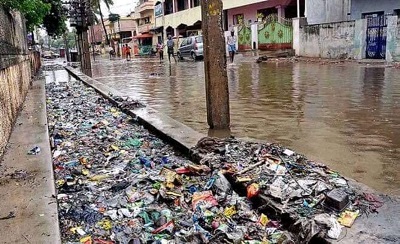
Have we lost the sanitation war?
The country’s Constitution in Article 41 spells out the civic responsibilities of every citizen. It further states that the exercise and the enjoyment of rights and freedoms are inseparable from the performance of duties and obligations by the citizen.
Advertisement
Among the duties spelt out is: it shall be the duty of every citizen to protect and safeguard the environment.
Therefore, the questions that beg for answers are: Why are Ghanaians reckless when it comes to the protection of the environment? Why do Ghanaians dump refuse into drains and water bodies? Is it indiscipline or bad attitudes in the proper handling of refuse?
These questions must agitate the minds of policymakers and local authorities as they might hold the key to dealing with our sanitation challenges across the country.
Some weeks ago, the Project Coordinator of the Greater Accra Resilient and Integrated Development Project (GARID), Dr Kwadwo Ohene Sarfoh, charged the courts and municipal, metropolitan and district assemblies (MMDAs) to enforce sanitation laws. That, he believed, would go a long way to prevent flooding, as the rainy season approached.
Dr Sarfoh added that all those living in Accra, particularly around the Odaw River, needed to check their behaviour because the fundamental cause of flooding was bad behaviour.
He was speaking at a workshop which brought together physical planners, work engineers, magistrates and prosecutors to sensitise them to building resilient communities for flood mitigation and responsible solid waste management through sustainable social and behaviour change communication.
It is interesting that at that same workshop, a facilitator, Edward Adimazoya, presented key highlights of a GARID Knowledge, Attitudes and Practice (KAP) survey on flood and flood-related behaviour.
According to him, while the construction of drains and other infrastructure was important, ensuring social behaviour change was key to addressing the causes of flooding, such as the dumping of refuse into drains and gutters.
Social behaviour change as the key to addressing the causes of flooding begins with a knowledge of why Ghanaians behave the way they do by putting their trash into drains and river bodies.
For the Daily Graphic, that would be the beginning of finding the solutions to the sanitation challenges in the country.
In some developed jurisdictions, it is anathema for chewed gum to be spat out onto a pavement. Spitting in public is not also allowed.
Attitudes of citizens are in sync with their immediate environment and surroundings.
The critical success factors in those jurisdictions have been sensitisation and the enforcement of the law. This is where we have failed woefully as a nation.
Our view is that the GARID Knowledge, Attitudes and Practice (KAP) survey must be key in any intervention aimed at solving the sanitation challenges in the country. In using the survey, the National Commission for Civic Education (NCCE) must be roped in.
NCCE must take on the task of sensitising Ghanaians to the ills of dumping refuse into water bodies until we get the message and see water bodies as living things that are critical to our very existence.
Then also, local authorities must sensitise the people by using the local units to get all to understand the ills of dumping refuse into rivers and drains and the consequences of such action.
Additionally, the government also, through the Ministry of Local Government and Rural Development, must provide the bins, equipment and landfill sites for the proper disposal of waste.
Sometimes, the failure by our governments to provide such facilities results in the disposal of waste indiscriminately by residents.



